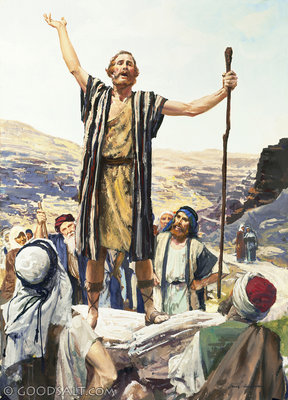(A biblical reflection on THE SECOND SUNDAY OF ADVENT, 7 December 2014)
Gospel Reading: Mark 1:1-8
First Reading: Isaiah 40:1-5,9-11; Psalms: Psalm 85:9-14; Second Reading: 2 Peter 3:8-14
The Scripture Text
The beginning of the Gospel of Jesus Christ, the Son of God. As it is written in Isaiah the prophet, “Behold, I send My messenger before thy face, who prepare thy way; the voice of one crying in the wilderness: Prepare the way of the Lord, make His paths straight.” John the baptizer appeared in the wilderness, preaching a baptism of repentance for the forgiveness of sins. And there went out to him all the country of Judea, and all the people of Jerusalem; and they were baptized by him in the river Jordan, confessing their sins. Now John was clothed with camel’s hair, and had a leather girdle around his waist, and ate locusts and wild honey. And he preached, saying, “After me comes He who is mightier than I, the thong of whose sandals I am not worthy to stoop down and untie. I have baptized you with water; but He will baptize you with the Holy Spirit.” (Mark 1:1-8 RSV)
The Good News is about Jesus Christ, the Son of God, who came into our world and released the life-giving waters of the Holy Spirit to flow within us.
Today we read the beginning of the holy Gospel according to Mark. He will be our guide to the memory of Jesus Christ for most of the Sundays of the coming year. Hence we can call it the year of Mark. Mark seems to have been the earliest of the four evangelists. He pioneered the work of setting to paper a comprehensive composition of the Christian community’s story of how God met mankind in the life of Jesus Christ.
Mark begins with a glorious statement of his intention to tell “the Good News about Jesus Christ, the Son of God” (Mark 1:1). Our older translations used the term Gospel for the Good News. Gospel is the shortened form of god-spel which in Old English meant good news. This is an attempt to translate the Greek word which Mark used, evangelion. We have to imagine a world without TV, radio or newspapers. The town-crier or the herald of the king would proclaim the great events to the people. When the event to be announced was one calling for joy and celebration it was called an evangelion. It might be news of a victory in battle or perhaps a birth in the royal family.
 The Christian writers, Paul and Mark especially, took over this word evangelion and invested it with a divine depth of meaning. As the herald of the great king, Mark begins his story of Jesus Christ with the proclamation that this was an evangelion. His use of the word has remained until our own day whenever we refer to the Gospel or to the Good News.
The Christian writers, Paul and Mark especially, took over this word evangelion and invested it with a divine depth of meaning. As the herald of the great king, Mark begins his story of Jesus Christ with the proclamation that this was an evangelion. His use of the word has remained until our own day whenever we refer to the Gospel or to the Good News.
After his initial proclamation Mark prefaces his story by relating how John the Baptist went before Jesus, as a messenger preparing the way and as a voice calling from the wilderness. Marks picks up the popular expectation that the prophet of olden times, Elijah, would come back to prepare the people for the Messiah, John appears in the primitive, non-conformist style of Elijah who had been described as “a man wearing a hair cloak and a leather loincloth” (2 Kings 1:8).
Mark differs from the evangelist Matthew and Luke in that he does not have the Baptist preaching a coming judgment as the urgent motive for repentance. In Mark’s gospel repentance wears a happy face.
Today’s liturgy links this gospel with a great message of consolation in the first reading. “Console my people ... Jerusalem’s time of services is ended ... her sin is atoned for.” Isaiah continues: “Sion, here is your God.” And that is the Good News which Mark sees the Baptist preparing for ... the coming of God.
The Good News of John the Baptist is twofold: it concerns the acknowledgment by people of their sins; and it offers the hope that someone is coming, someone powerful, someone who will release the life-giving waters of God’s Spirit upon the earth. Later on the preaching of Jesus will carry on this twofold message: repent and believe.
It may seem strange to suggest that the Good News is firstly about sin. But while everybody admits that there is a great deal wrong with our world, we have largely forgotten the name of the disease. When a physician diagnoses what is wrong with a patient then the anxiety of all unknown possibilities is removed. The name of society’s disease is sin. John the Baptist enabled people to accept this diagnosis and led them to the waters of renewal. Here the energy to repent comes, not so much from the fear of judgment, but from the approaching footfalls of the Messiah.
The work of John the Baptist was not to be an end in itself. He came in the style of Elijah to prepare the way for the Messiah. And so, John’s function was to hand over to the One with God’s power and worthiness, the One invested with the Holy Spirit.
This Advent, repentance comes as a message of consolations and wears a happy face. It is Good News when we acknowledge truthfully our personal responsibility for sin and place our hope in the divine power of the Holy Spirit, which Jesus released for our forgiveness and healing. The Good News began in the diagnosis of our pain, sin; and in recognizing the healing power that God sends us, the Holy Spirit.
Short Prayer: Heavenly Father, we thank You for sending John the Baptist to prepare the way for the Messiah, Your only begotten Son, Jesus Christ, who came to the world for our eternal salvation. Amen.
Main source: Fr. Silvester O’Flynn OFMCap., The Good News of Mark’s Year, Dublin, Ireland: The Columbia Press/Cathedral Books, 1990 (reprinted 1993), pages 10-12.
Jakarta, 4 December 2014
A Christian Pilgrim

No comments:
Post a Comment